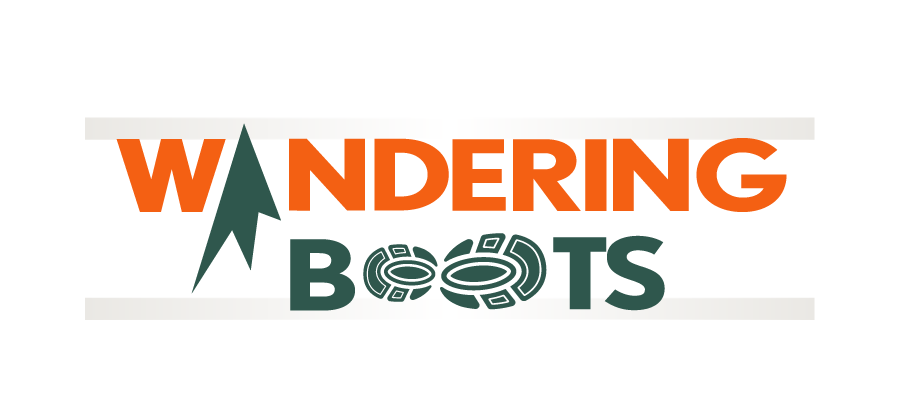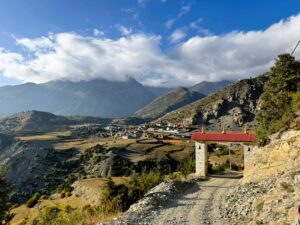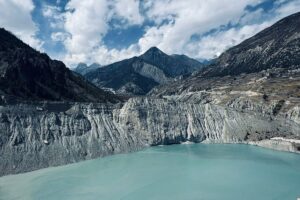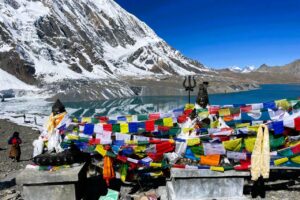- Overview
- Trip Outline
- Trip Inclusions
- Trip Exclusions
- Gallery
- Reviews
- Book Now
- FAQ
The Trek
The Annapurna Valley was first explored in 1950 by a French Expedition team trying to attempt a summit. Their account and description of the valley encouraged and motivated many travelers to explore what is now known by many as the most beautiful sanctuary in the Himalayas. The Annapurna Circuit is one of the most prestigious and challenging treks one can go on. While on the trek you go through dense forests, beautiful villages, stay at the local tea houses and get offered spectacular views!
The Area
The Annapurna Circuit trek is located in the Annapurna Sanctuary 40kms north of Pokhra in the Kaski district of Nepal. It is inhabited by the native Gurung people who hold this sanctuary sacred. The peak of Machapuchare at the entrance is believed to be the home of God Shiva.
Expected Weather
- Chances of rain/ hail – Mild drizzles
- Temperatures- Afternoon upto 20 degrees, Nights around zero degrees
How are we making your experience better?
1. On this trek we take you to Lake Tilicho. Not all trekkers who do the Annapurna circuit trek get a chance to go to Lake Tilicho, which is a pity because the lake is a sight to behold! We add Lake Tilicho to our itinerary, ensuring all our trekkers get to see it, making it not only a beautiful addition but also an exclusive one! It also makes for a good acclimatization exercise preparing the trekkers well for the pass day at Thorung La.
2. We are driving up to Chame to reduce the walk on the motorable road.
3. On this trek we take you to visit the Ghyaru Village. The route to this village is extremely beautiful and scenic. We stop for lunch at this village providing you a peek into the culture of the local inhabitants there.
4. On the acclimatization day at Manang we take you on a hike to the Milarepa caves which is another exclusive addition to the itinerary.
Day 1: Arrive in Kathmandu. Check into hotel.
Meet fellow trekkers. Briefing in the evening. Overnight stay in hotel.
Day 2: Drive from Kathmandu to Chame
Drive from Kathmandu to Besishahar in normal vehicle. We change cars at Besishahar and go from Besishahar to Chame in an offloading vehicle.
Halt in Jagat for lunch enroute. Take a dip in the hot springs at Jagat. Overnight stay in tea house at Chame.
Day 3: Trek from Chame to Upper Pisang
Trek Distance: 15 kms; Trek Time: 6 hours
Overnight stay in tea house at Upper Pisang.
Day 4: Trek from Upper Pisang to Ghyaru
Trek Distance: 8 kms; Trek Time: 6 hours
Overnight stay in tea house at Ghyaru.
Day 5: Trek from Ghyaru to Manang
Trek Distance: 10kms; Trek Time: 8 hours
Overnight stay in tea house at Manang.
Day 6: Acclimatization day at Manang
Hike to Milarepa caves
Trek Distance: 12.5 kms; Trek Time: 7 hours
Overnight stay in tea house at Manang.
Day 7: Trek from Manang to Tilicho Base Camp
Trek Distance: 14 kms; Trek Time: 7 hours
Overnight stay in tea house at Tilicho Base Camp.
Day 8: Trek from Tilicho Base Camp to Tilicho Lake & then to Srikharkha
Trek Distance: 13 kms; Trek Time: 10 hours
Overnight stay in tea house at Srikharkha
Day 9: Trek from Srikharkha to Yok Kharkha
Trek Distance: 8 kms; Trek Time: 5 hours
Overnight stay in tea house at Yok Kharkha
Day 10: Trek from Yok Kharkha to High Camp
Trek Distance: 10 kms; Trek Time: 7 hours
Overnight stay in tea house at High Camp
Day 11: Trek from High Camp to Muktinath via Thorung La
Trek Distance: 11 kms; Trek Time: 8 hours
Overnight stay in tea house at Muktinath
Day 12: Fly / Drive back from Muktinath to Pokhara
Trek ends upon reaching Pokhara
Day 13 (Buffer day): This day will only be utilized if the weather turns bad.
- Stay in Kathmandu on Day 1.
- Accommodation (On twin or triple sharing basis) for the duration of the trek.
- All meals and drinking water during the duration of trek
- Drive from Mukti Nath to Pokhara
- All National park entry and forest permit fee.
- Rentals for all common gear provided to you like tent and sleeping bags.
- Guide and Expertise charges
- A high altitude medical kit which includes oxygen cylinders, Oximeters, BP meter and Medicines.
- 5% GST
- Flight from Muktinath to Pokhara.
- Stay in Pokhara on last day.
- Meals in Kathmandu
- Rentals for personal clothing.
- Flight/train till Kathmandu.
- Buffer day charges.
- Backpack offloading charges. You are expected to carry your own backpack. Trekkers unable to do so can opt for a porterage service accordingly.
- Staff Tips
Yes, If you're flying into Nepal you need a passport to show at the airport in Nepal.
You can arrive in Kathmandu on day 1 till 5:00 PM (latest) and leave from Pokhara on last day by noon (12:00 PM)
We will be staying at tea houses for the entire duration of the trek. Some tea houses will have two-in-a-room accommodation, and as we go higher, due to space constraints, it may be three to four trekkers in one room.
The tea houses will have Indian style washrooms on shared basis (no attached washrooms with rooms).
Yes, the tea houses will have electric points to charge your phones and cams. Some tea houses charge for the usage of electric points for charging. This will be an additional cost borne by the trekker.
No, the tea houses will not have heating facilities. For sleeping, the tea houses have blankets which serve well for keeping warm.
Yes, most of the tea houses in Nepal do have Wifi. In some tea houses it is paid and in some it is free of cost. You will find a Wifi connection at most places in Nepal.
We recommend each trekker take his/ her individual travel insurance from India (own country) itself. The travel insurance in Nepal is very expensive. To be on a safer side and for a strong mind set, having an individual travel insurance that covers medical emergencies is recommended specially when one undertakes outdoor expeditions such as trekking and mountaineering.
Yes. Indian currency in the form of 100 rupee and 500 rupee notes works in Nepal. You will have SBI ATMs in Nepal
On a trek one is expected to carry your own backpack. Trekkers unable to do so can opt for a porterage service accordingly. The charges for this are 1000 INR per day per bag(weight not exceeding 8-10kg)
Budget hotel - Hotel Royal Suite, cost 1600 NPR per night
Medium range - Kathmandu guest house, 3500 NPR per night
Luxury - Fairfield by Marriott
All these hotels are in Thamel, Kathmandu
From airport to reach Thamel a cab ride would cost approximately 500 NPR
Pokhara - Budget hotel - Hotel Serenity (not great on service) cost for one night 1600-1800 NPR.
Medium range hotel - Hotel Eternity cost for one night 2000-2500 NPR.
Comfortable stay - Hotel Clock; cost 2500+ NPR
All the costs are inclusive of breakfast
All these hotels are near lakeside Pokhara
A certified trek leader, a guide, cook & porters will accompany you during the trek.
We’ve been organizing treks for over five years and have had many female trekkers trek with us. In fact, a lot of them come solo for treks. There has never been a complaint about the atmosphere of a trek, about other trekkers or our professionalism. They have all been kind enough to leave a review.
You can prepare for the trek with a combination of Cardio & Strength activities
7-8 kms slow jog OR 25kms kms cycling. Pace is not important, consistency is important (non-stop jogging/running/cycling)
Squats 30 x 3, Lunges 30 x 3, Calf raises 30 x 3
All of the above at least 6 times a week
Climbing stairs 75 floors with backpack (Once a week, ideally after a run)
1. Good Sturdy Backpack: Prefer a trekking pack over a backpacking one. The size of the backpack depends upon the participant. Normally for a 7-9 day trek a 50-60 litre pack should suffice.
2. Shoes: Any waterproof trek (not hike) shoe would be ideal.
3. Socks: 3 pair cottons and 3 pairs of woollens.
4. Trek pants (ideally water resistant): Get two quick dry summer trek pants. On summit climb or a major altitude gain day for Goechala, Rupin and Stok), you can replace one dry fit trek pant with Shell trekking pants. If you don’t have trek pants you can replace it with Gym track pants.
5. T-shirt/ Base layer: Get 3 T-shirts/ trekking base layer on the trek, one of which should be thick and full sleeve. Avoid cotton and prefer dry fit.
6. Fleece/ Sweater/ good quality Hoodie: Get 1 fleece jacket or sweater. Fleece is preferred over sweater or hoodie as it is lightweight and easy to carry. Sweaters and Jackets can be heavier than Fleece for the warmth they offer.
7. Down/ Padded Jacket – Down/ Padded jacket (Upto -5 degrees). If you don’t want to get a padded/ down jacket, get two fleeces.
8. Cotton track pants for camp – These are specifically for cold evenings at the campsite. This can be ignored if you are comfortable wearing your trekking pants in the camp.
9. Thermals: 1 pair. We wear thermals only upon reaching the campsite not while trekking.
10. Windproof Jacket: All rain proof can be used as Wind proofs. Required as an additional layer during trekking in windy conditions. Avoid if you have a rain proof jacket.
11. Rainwear:
Option A – Rain set – One Waterproof jacket (3000 mm waterproofing), Rain proof pants and Bag cover
Option two – Poncho that covers your body and bag completely.
We ideally recommend Option 1 as poncho makes trekking difficult.
12. Woolen Cap/ Balaclava-1: To cover your ears, head and neck. Get one woollen cap and one neck warmer or balaclava.
13. Neck Warmer/ Scarf-1: For evenings. Avoid if you are comfortable using a Balaclava.
14. Gloves: 2 gloves out of which 1 can be water proof and one woollen. The waterproof one has to ideally be padded and a size larger than you normally use. This is so that you can wear both your gloves together if required.
15. Suncap – 1
16. Sunglasses – 1
17. Toiletries – Also include sunscreen, moisturizer and lip-cream
18. Headlamp/Torch -1. Preferably headlamp.
19. Two water bottles (1 litre each) – One can be a thermos flask. One can also get a hydration pack.
20. Camp shoes/ Flip flops for camp
21. Plastic covers for inside the backpack to keep your clothes dry
22. Daypack – Required if you have a summit days climb. Preferably one that can be compressed.
23. Documents: 2 passport sized photograph, Address and Photo proof (Driving License or Aadhaar card), Doctor’s medical certificate saying that you are fit for the trek. We reserve the right to not take you on the trek if you fail to produce this.
24. Trekking pole
The common perception is that alcohol makes you feel warmer, however it also dehydrates you & dehydration can be fatal while trekking. Hence consumption of alcohol is prohibited. Smoking in camps is not allowed.
Most wild animals are naturally wary of human activity and prefer to stay in more remote, quieter parts of their habitat. Here’s why wild animals typically do not approach camps.
If you cancel –
– 60 days before the trip: we can process a complete refund minus minimum processing charges.
– Between 30-45 days before the trip: you will be refunded 50% of the trek fee.
– Within 30 days before the trek starts: No refund.
– If your spot is replaced in a full batch: we will process a complete refund after canceling minute operational charges. (For fixed departures only)





































There are no reviews yet.